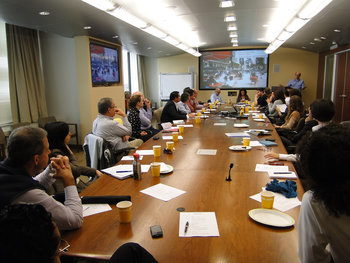
Ambition
The principle that you will be fiercely competitive and driven.Strive to be the best.
Persistence
A statement that you will not be easily discouraged but will push through challenges.Never give up.
Urgency
The principle that you will not find excuses to slow things down but will rather find ways to do things surprisingly fast.Maintain a sense of urgency and work to speed.
Vision
Leading such that you pave a way that many follow.Define the future.
Change
Acceptance of change and rejection of resistance to change.Change faster than the competition.
Stability
A pledge to maintain fidelity with the past.Live the tradition.
Good
The unambiguous principle that you will have an overwhelmingly positive impact on the world.Make the world a better place for everyone.
Stewardship
Responsible stewardship of resources.Do no harm to air, water, soil or ecosystems.
Global Responsibility
Thinking beyond your community to make the world a better place.Sustainability
Building systems to last and allowing external systems such as ecosystems to last by not harming them.Do everything in a sustainable manner in order to make the future better for planet, people and stakeholders of our company.
Transparency
The principle that you freely and openly share information.Work to openly give stakeholders the information they need.
Equality
The principle that you do not discriminate.Do not treat people differently based on their race, appearance, age, gender, religion, belief, disability, family status, pregnancy or sexual orientation.
Meritocracy
The principle that opportunity and reward are based on an individual's merits as opposed to factors such as who they know.Opportunity and reward are merit based.
Compassion
Sympathy for the misfortune of others and a drive to help those who need it.Always help those in need.
Diversity
The principle that diversity has value. This can include both intellectual diversity and diversity of background.Include and collaborate with people of diverse backgrounds, cultures and beliefs.
Tolerance for Disagreement
A principle that asks for open criticism of ideas.Openly, candidly and bravely explore ideas and handle criticism positively.
Civility
Civility is a demonstration of respect for people and society.Afford everyone respect and personal courtesy, even if you strongly disagree with them.
Politeness
The principle that you remain polite in the face of stress, disrespect and insult.Take the high road and remain professional and polite.
Candor
Candor is the quality of being open and honest in communication.We communicate with candor and do not hold back valuable information or criticism.
Teamwork
Encouraging people to work together productively.Work together as a team and avoid negative politics.
Recognition
Recognizing the talents and successes of others.We take time to celebrate successes and recognize talented contributors.
Risk Taking
Embracing calculated risk taking.Experiment, challenge and take worthy risks.
Risk Management
The principles that risks be identified, analyzed and treated.Identify and manage risk.
Resilience
Resilience is the design of systems, services and infrastructure to withstand to stresses. A resilient design prevents risks before they can even be identified. As such, resilience can be orders of magnitude more valuable than a reactive risk management stance.Design for resilience.
Design Thinking
Design thinking is the use of design to solve problems that aren't traditionally viewed as design.We solve most problems with design.
Failure
A principle such as fail well that deals with failure and how to bravely experiment without taking large risks.Fail cheap, safe, quick and often.
Reliability
Building systems, services and products to provide consistent performance in a wide range of real world conditions over time.We build things that rarely break.
Quality
Quality is the real value of something to a customer, business or end-user.Quality is always our top priority.
Cost
The principle that you not waste money.Constantly eliminate unnecessary cost.
Creativity
Creativity is the development of non-obvious value.Work with creativity and passion to find leaps forward.
Accessibility
Designing things to be accessible for as many people as possible including people with disabilities.Usability
Principles related to the design of things to be easy, pleasing and productive to use.If it's not a pleasure to use, it's not worth shipping.
Customer Needs
A dedication to serving customer needs.Solve problems for the customer.
Health & Safety
Prioritizing the health and safety of employees, customers and communities above all else.Safety first.
Learning
The pursuit of learning and personal growth.Take time to learn, develop and grow.
Mastery
Mastery is the pursuit of perfection in an art, domain or profession. This requires discipline and time.Pursue refinement and mastery of your art.
Communication
Communication related principles such as the use of plain language.Communicate with clear, succinct language.
Listening
Principles that call for devoting your full attention to someone when they are speaking.Listen with intent to understand.
Accountability
The principle that you make decisions bravely and take responsibility for both failure and success.Promptly make the best decision possible and stand by results.
Objectivity
The open-minded pursuit of truth as opposed to blindly promoting an agenda.We base analysis on an honest weighting of all available evidence.
Humility
Principles that ask for humility.Maintain a healthy fear of forces that have the power to disrupt your plans.
Trust
The principle that you place trust in people and give them the benefit of doubt.Trust by default.
Authenticity
Values related to not faking anything.Own it, deserve it.
Customer
Affording special respect to your customers and focusing your efforts on their needs.The customer is always right.
Confidentiality
Principles related to confidentiality and privacy.Respect the customer's right to privacy.
Innovation
The pursuit of innovation.We aggressively seek leaps forward.
Improvement
Principles related to regular improvement.Improve, measure, improve again in quick cycles.
Work Ethic
Principles related to working hard or diligently.We work with intensity and focus.
Greatness
The principle that you will fight mediocrity and complacency.Good isn't good enough.
Productivity
Productivity is the amount you produce in an hour of work.Eliminate toil.
Efficiency
Efficiency is the output you get for a unit of input.Push to reduce waste.
Time Management
Time management values may be an embrace of a time management technique or a general principle to use time wisely.Find ways to do more with the time you are given.
Competition
Values related to competitive spirit.Winning isn't a sometimes thing; it's an all the time thing.
~ Vince Lombardi
Simplicity
Principles related to keeping things as simple as possible.Complexity
An embrace of complexity that has value.Integrity
Principles related to morals such as honesty and fairness.Avoid doing what you would blame others for doing.
~ Thales
Quality of Life
Prioritizing quality of life, happiness and self-fulfillment.Do that which will make you happy with yourself.
Notes
The values above are examples and are not consistent as a set.Any similarity between the list above and published corporate values are coincidental.| Overview: Core Values | ||
Type | ||
Definition | Intractable principles that are adopted by a society, culture, organization, group or individual to guide strategy, policy, decision making and action. | |
Related Concepts | ||










































